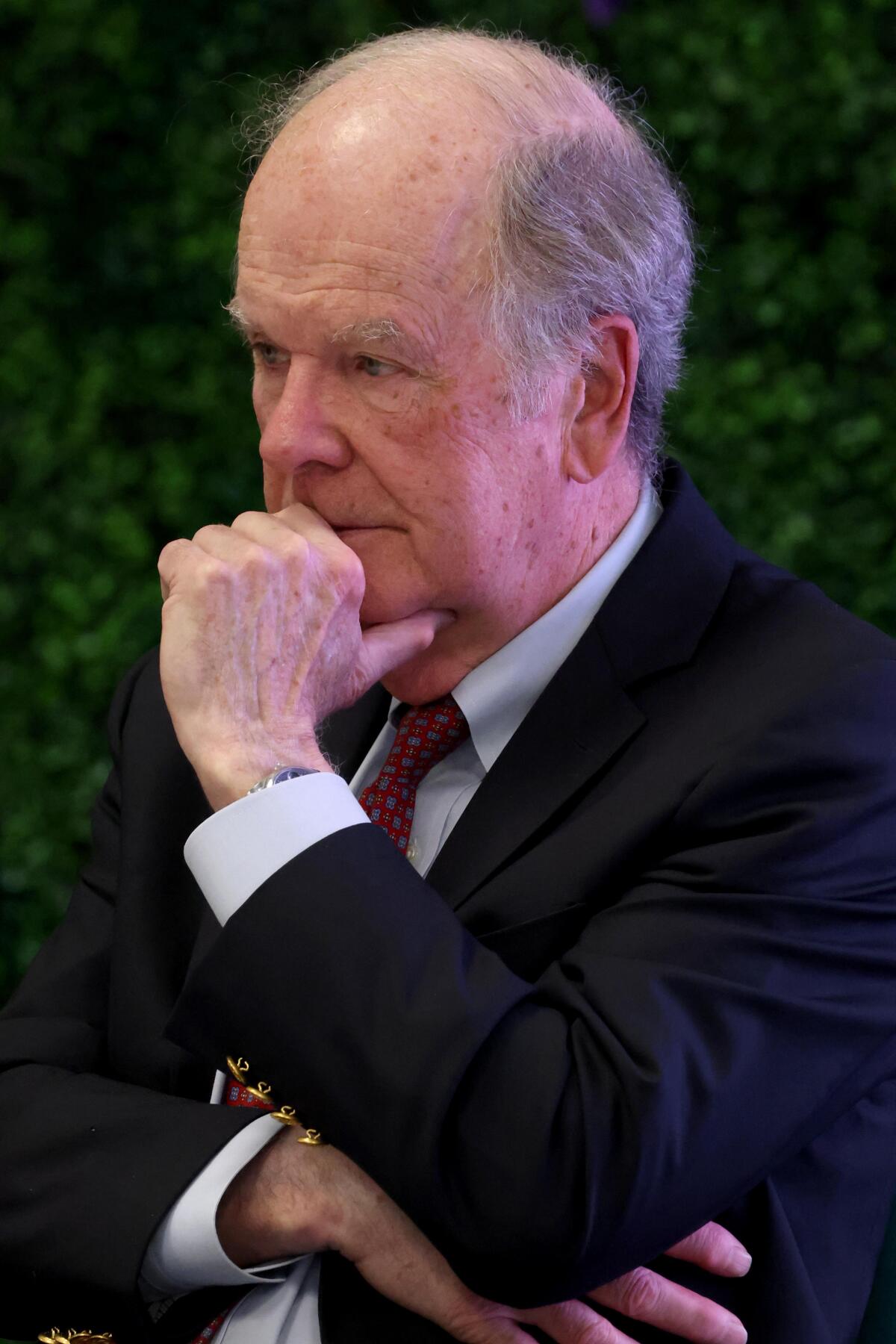Jail watchdog faces elimination under L.A. County plan
An oversight body that has documented and exposed substandard jail conditions for decades would cease to exist if the Los Angeles County Board of Supervisors moves forward with a cost-cutting plan.
L.A. County could save about $40,000 a year by eliminating the Sybil Brand Commission, according to an August report prepared for the supervisors by the board’s Executive Office.
The Sybil Brand Commission’s 10 members serve a key oversight role, regularly conducting unannounced inspections of county jails and lockups.
Named for a philanthropist and activist who worked to improve jail conditions for women in L.A. starting in the 1940s, the commission’s findings were recently cited in a state lawsuit over what Atty. Gen. Rob Bonta called a “humanitarian crisis” inside the county jails.
“In June 2024, the Sybil Brand Commission reported that multiple dorms at Men’s Central were overcrowded with broken toilets … and ceilings that had been painted over to cover mold,” Bonta’s office wrote in its complaint, which seeks to compel reforms by the county and sheriff’s department.
The recommendation to “sunset” the commission comes amid a spike in in-custody deaths with 38 so far this year, which puts the county on track for what Bonta’s office said would mark at least a 20-year high.
The Executive Office for the Board of Supervisors responded to questions from The Times with a statement Friday that said its report’s “purpose was not to eliminate oversight or input,” but to demonstrate “where responsibilities overlap and where efficiencies could strengthen oversight and support.”
The unattributed statement said the report found issues with “commissioner availability” that led to meeting cancellations and put “limits on their ability to conduct inspections.”
The Sybil Brand Commission took up the possibility of elimination at its meeting earlier this month, when commissioners and advocates railed against the proposal as a shortsighted way to cut costs that will leave county inmates more vulnerable to mistreatment and neglect.
In a separate move, the Executive Office of the Board of Supervisors is reassigning or eliminating a third of Inspector General Max Huntsman’s staff, slashing funding to the watchdog that investigates misconduct by county employees and the sheriff’s department, according to Huntsman.
“At the back of all this is the fundamental question of whether the board wants oversight at all,” Eric Miller, a Sybil Brand commissioner, said in an interview.
Miller added that the “sunsetting of Sybil Brand seems to be part of a persistent attempt to control and limit oversight of the sheriff’s department.”
The report from the Executive Office of the Board of Supervisors said its recommendation to do away with the jail oversight body came after a review of “225 commissions, committees, boards, authorities, and task forces” funded by the county. The proposal would “sunset” six commissions, including Sybil Brand, and “potentially merge” 40 others.
The report noted that “jail and detention inspection duties are also monitored by the Sheriff Civilian Oversight Commission.”
But that commission, which was established less than a decade ago, takes on a broader range of issues within the sheriff’s department, from deputy misconduct to so-called deputy gangs. Unlike Sybil Brand, its members do not go on frequent tours of jails and publish detailed reports documenting the conditions.
The Executive Office’s statement said “unannounced jail inspections would continue, either through a COC subcommittee or coordinated oversight structure.”
Peter Eliasberg, chief counsel for the American Civil Liberties Union of Southern California, said the proposal to get rid of the commission is the latest in a recent succession of blows to law enforcement accountability.
That list includes the ousting of former Sheriff Civilian Oversight Commission chair Robert Bonner earlier this year, and the introduction last week of a county policy requiring oversight bodies to submit many of their communications to the county for approval.
Eliasberg said losing the Sybil Brand Commission would be a major setback.
“Sybil Brand has been incredibly effective in shining a really harsh spotlight on some terrible things going on in the jails,” he said. “Sybil Brand, I think, has done some really important work.”
Huntsman, the inspector general, said during a Probation Oversight Commission meeting Monday that his office expects to lose a third of its staff. The “current plan proposes to eliminate 14 positions including vacancies,” according to the Executive Office statement.
Huntsman told the commission that the Executive Office of the Board of Supervisors informed him on Sept. 11 that “a number of positions in my office will be taken away from me and moved to the Executive Office and will no longer be available for independent oversight.”
The inspector general added that “there’s a group of staff that have been specifically identified by the Executive Office and taken away, and then there are positions that are curtailed. So the end result is we have a third fewer people, which will impact our operations.”
The Executive Office’s statement said the changes would “save more than $3.95 million” and avoid “deeper cuts” elsewhere.
“We remain confident that the OIG’s remaining staffing levels will allow the OIG to fulfill its essential duties and carry out its mandate,” the statement said.
Late Friday afternoon, Edward Yen, executive officer for the Board of Supervisors, sent out an email “retracting” the new county policy that required many communications by oversight bodies to undergo prior approval.
“While the intent of the policy was to provide long-requested structure and support for commissions and oversight bodies,” Yen wrote, “we recognize that its rollout created confusion and unintended consequences.”

